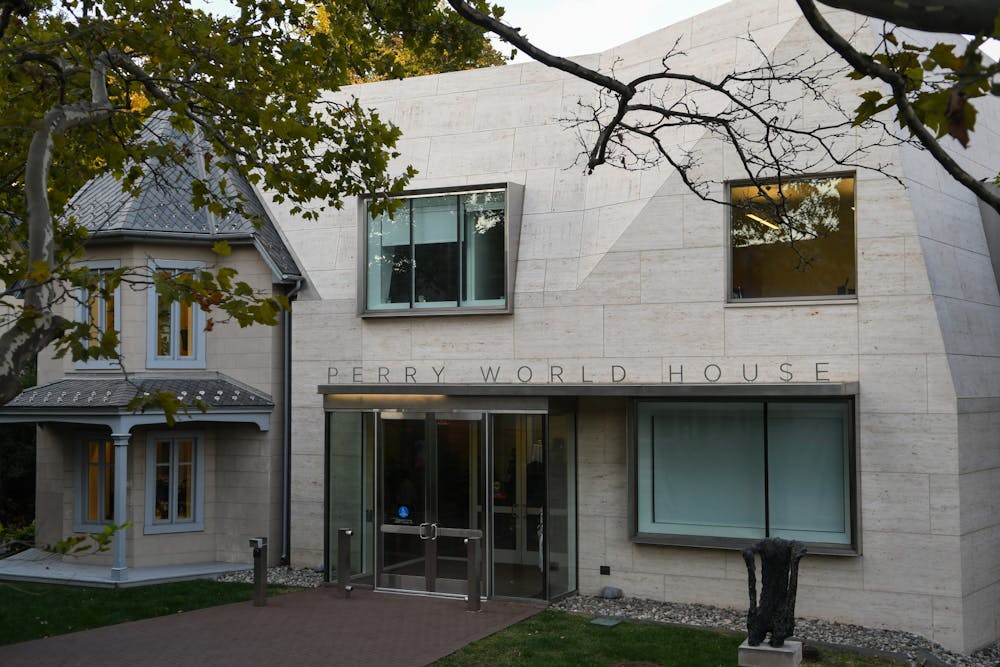
Around 75 community members attended a community listening session at Perry World House hosted by Interim Penn President Larry Jameson and Provost John Jackson Jr.
At the session, attendees heard from 10 members of the Penn community, who shared their perspectives on campus safety, open expression, and administrative inaction since the Oct. 7, 2023 Hamas attack on Israel. Jameson announced the session in a Monday evening email as a space for “students, faculty, and staff to share their thoughts on the impacts of the conflict in the Middle East on our campus.”
During the session, Wharton senior Rayane Taroua called on the University to provide better protections for students who spoke up against the violence in the ongoing war and advocated for Penn to do the same.
Another speaker, who requested anonymity due to fear of harassment, said that they regularly feel unsafe on campus, specifically describing feeling afraid at everyday campus activities such as using the library, arranging departmental meetings, and attending events at Houston Hall.
A College junior, who requested anonymity due to fear of harassment, told attendees that her peers, as well as faculty in the Middle Eastern Studies department and Arabic departments, have faced harassment, “receiving multiple aggressive and threatening emails.” She contended that, though student groups have attempted to unify Palestinian and Israeli voices this semester, threats to the safety of Palestinian students led to the cancellation of events aimed at doing so.
“Palestinian voices are often faced with direct threats to their safety, which has resulted in the cancellation of many of these events, further complicating a one-sided narrative and alienating Palestinian voices,” she said.
She directly addressed Jameson and Jackson, criticizing Penn’s administration for how they have interacted with pro-Palestinian campus groups.
“Instead of working with these groups in a respectful and productive way, you have chosen to vilify,” she said. “I’m asking you to stop vilifying and weaponizing peaceful protests, to take tangible steps, meet our calls, and empathize with our trauma.”
Another community member, who requested anonymity due to fear of retaliation, called on University administration to institute freedom of expression and encourage respectful dialogue to the extent that “instruction [may] go on, and safe living on campus persists for everyone.”
“I call on the University to clarify the pragmatic limitations on free speech that enable beneficial and civil dialogue, and a peaceful coexistence,” they said.
At the conclusion of the session, both Jameson and Jackson addressed the speakers and the audience at large.
Jameson acknowledged the “bravery” of attendees, emphasizing the importance of safety and diversity in Penn’s community.
“I [heard] in the group the struggles that you have with having your identity recognized, feeling like you’re being listened to," Jameson said. "Sessions like this are one part of the solution.”
Jackson spoke on the importance of not just listening, but also taking actionable steps from the lessons learned from that listening.
“The theme that’s come up over and over again is [making sure] what we hear gets translated into practice, and that’s one of the things we certainly both support but also are trying to figure out how to do responsibly and effectively,” he said.
Rachel Sweeney, a bioinformatician at Stellar-Chance Laboratories who attended the listening session and said that she identifies as Jewish and a Zionist, added that the session gave her another outlook on how people feel about the conflict.
“It was good to hear how people from the pro-Palestinian side felt, and I think that the session was productive because everyone did listen regardless of whether or not everyone agreed with each other,” she said.
The Daily Pennsylvanian is an independent, student-run newspaper. Please consider making a donation to support the coverage that shapes the University. Your generosity ensures a future of strong journalism at Penn.
Donate







